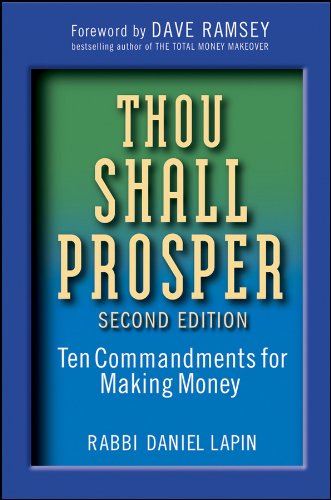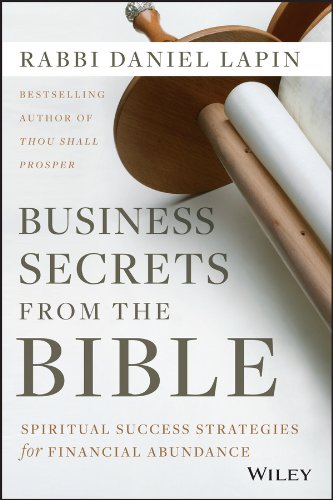In this Episode
- [01:55]Daniel talks about the intersection of finance and spirituality, because people tend to treat them as completely separate. He also discusses the disproportionate success with money amongst Jewish people as opposed to other groups.
- [05:06]Daniel clarifies what he means by “physical” and “spiritual” so we can all be on the same page regarding those terms.
- [07:18]What is money? Daniel digs into this question and the importance of establishing the nature of money.
- [12:05]Stephan is reminded of a previous episode with Yehuda Ashkenazi in which they talked about money as energy.
- [12:45]Daniel likes being very specific and tangible when it comes to money, he explains.
- [14:33]What would Daniel say to people who tell themselves unhelpful stories about money? In his answer, he talks about the necessity of trust in the relationship of transactions.
- [20:32]We hear Daniel’s thoughts on people in the pursuit of money seeing money as win-lose instead of win-win.
- [22:57]The Hebrew word for prayer is a reflexive verb, Daniel explains.
- [24:21]How would Daniel define prosperity? In his answer, he points out that wealth and poverty are terms that make sense for animals, but not for human beings, because they’re relative terms.
- [29:05]We hear Daniel’s thoughts on the differentiation between tithing and giving to the homeless.
- [30:56]Daniel shares a question that someone asked him about the most beneficial way of distributing money.
- [33:14]Where does the 10% number for tithing come from?
- [34:40]We learn about Daniel’s ten commandments for making money in a sustainable way that benefits others.
- [40:33]Stephan asks one last question: why does Daniel say that one should never retire? The answer involves forming a genuine relationship with the people you have financial transactions with.
- [43:42]Daniel lists some of the places where listeners can learn more from (or about) him.
Thank you so much. Delighted to be with you.

Let’s talk about the intersection of finance and spirituality because I think, people tend to treat them as completely separate and compartmentalize, some are like, “Okay, I’m gonna do my spiritual practice. Now I’m gonna work on making money or I’m gonna build up my career or do my business.” These two intersect and when you’re living a good life, they actually dovetail quite nicely, right?
I think so, yes.
Let’s talk about how that does. How does that work?
Let me start off with the avenue that led me to this awareness. It was many, many years of research, onto a very basic question, and it was a question that only a circumcised American could ask. It was a question that if anybody other than Rabbi posts, such a person would be instantly subjected to vilification as an anti-semitic bigot. The question was, “Why are Jews disproportionately good with money?” It’s a question that makes a lot of people uncomfortable. But if truth be told, you’d have to be a blind immigrant from out of Mongolia not to have noticed that a disproportionate number of people who are good with money happened to be of the people of Israel. The Forbes 400 list of richest American, just to give you one example, since Jews constitute 1.5% of America’s population, that means that there should be about 6 Jews on the Forbes 400 list. Since the list began, there’s never been a year with fewer than 60 which is a 10 times over-representation. Most years have about 100 Jews. It’s a wildly over representative group in this area. No, you do not find many Jews in the NFL. You don’t find many Jews in professional wrestling. You don’t find many Jews in the professional ranks of the military, but you do find Jews doing very well in business, so much so that it’s not an illegitimate question to ask, “Why would that be?” Immediately, I start thinking of dividing the answer into two possibilities. It’s either a physical answer or it’s a spiritual answer. If the answer if physical then there is absolutely no point in continuing this conversation because nothing I’m going to say is of the slightest interest to anybody in your audience who isn’t Jewish. In other words, if this has to do with your being circumcised, or carrying certain money genes in Jewish sperm, or this has to do with some sort of materialistic behavior.
The Oxford English defines the word Jew as a verb, as in ‘to jew’ somebody. Is that part of Jewish manner of success? Inordinate flexibility on matters of morality and ethics. I had to eliminate all those possibilities. When all was said and done, at the end of that exploration which involved interviews with hundreds, and hundreds of non-Jewish Americans who have done business with Jewish people for a lifetime, the answer became abundantly clear. That is that the explanation for an arguable Jewish success with money, it’s not to say that there are no poor Jews, of course, there are, but the number of successful Jews is disproportionately high. The reason was spiritual, not physical. May I just clarify, Stephan, what I mean by physical and spiritual because I think it’s important at the outset to define those terms.

Yeah, for sure.
Physical is anything than can be measured in a laboratory. A saxophone is physical because it has a weight and it produces a certain kind of sound, whose frequency can be measured on an audio spectrometer, it’s not hard. But a tune is purely spiritual. You cannot weigh it. There’s nothing you can measure. If you put it through an audio spectrometer, all you’re gonna get is an indication of sound but you will never have any machine that can tell you whether this particular tune makes people sad and [inaudible [00:04:57] or whether this particular tune makes people wanna tap their feet or that particular tunes makes men wanna get up and march off to war. Those are spiritual matters vibrating air molecules, get converted into uplifting, or sad music in between the two ears within the human mind, within the human soul. Spiritual cannot be measured in a lab, physical can. When I hire somebody for my business, I’m sure very, very similar to you in this respect, the truth is I’m hiring somebody because of their spiritual characteristics, not their physical. I don’t care if they’re black, or brown, or white. I don’t care if they have a lot of hair on their hear or no hair on their head. I don’t care how much they weigh. I don’t care about their gender. I don’t about any of those things. But what I do care about is honesty and integrity. I care about persistence. I care about the ability to recover from a put down, pick one’s self up off the ground, and get up and get back in the ring. Those are the measures that define who I’m going to hire.
Those things are pure spiritual characteristics. I care about a person’s optimism or is a person susceptible to bouts of pessimism and depression. Spiritual, “Sorry, I can’t use you.” But if you have all those spiritual characteristics, you and me can do very for each other if we collaborate. The question then arose as to, “Well, how about money? What is money?” Here, it became incredibly important to establish the nature of money because, not to be unnecessarily frivolous about it, but if you go fishing and you know absolutely nothing about the fish you’re hoping to catch, your chances of success, pretty close to zero. Similarly, if you engage in an enterprise that is meant to bring money into your orbit then you absolutely need to understand the nature of that thing you are pursuing. You have to understand exactly what it is. Again, one of the first questions was, “Is money physical or spiritual?” Well, one of the characteristics of physical is not only that it can be measured in a lab but also that it can only occupy one single place on the time-space continuum which is to say that if I put a book on my desk, then that book being a physical object is on my desk at this particular moment. If you then walk in, pick it up and take it away, it is now no longer on my desk, it is not with you. It cannot be in both places.

But if you walk into my studio and you hear me playing a tune on the piano which given my total lack of talent is extremely unlikely, but theoretically you hear me playing a tune, you perk up, you say, “That’s a beautiful tune.” And I say, “Well, I’ll play it again for you.” I’ll play it again for you and you hum it up and you say, “I think I got it.” I’d say, “I think you have.” You walk away, you’ve now got a tune. Do I find myself minus one tune as I was minus one book? Of course not, because a tune is spiritual. We gotta ask ourselves if a customer walks into a store and he wants a pair of those sneakers with lights in the heels that light up when you walk. He hands over $50 to the storekeeper, is he now walking around miserable because he used to have $50 and now he doesn’t, or does he say, “I’m perfectly happy.” There’s an easy thought experiment. All we do is we go up to him on his way out of the store, we catch up with him in the food court of the mall, and we say, “Hey, we saw you just buy a pair of sneakers with those light in the heels that light up.” He says, “Yeah, just got it. Right here.” We say, “How much did you pay for it?” He says, “ $50.” He says, “Tell you what, it looks like you’re now minus $50. You used to have $50 in your wallet which you don’t have now. How about we give you $50 and we’ll take away those shoes?” What’s the guy gonna say?
[inaudible [00:09:36] you know.
“You’re crazy. It’s taken me three weeks to find exactly the ones that I want with the right color lights in my size.” And we say, “Okay, $60?” He says, “Get out of here. You’re being ridiculous.” “$75? $80?” Well, we’d probably reach a certain figure maybe somewhere around $100 where he would say, “Well, this is okay. You know what? It’s probably worth my while. I can go and take the time to find another pair and I’ll still have $50 left. Yeah, I’ll sell it to you for $100.” That tells us that in this man’s financial statement, leaving aside gap accounting, we don’t have to use generally accepted accounting principles here because we’re not dealing with the SEC, we’re dealing with truth and authenticity. We can now establish that this man’s asset value has increased by $50 because of his purchase of the shoes, it didn’t diminish. The proof is that he would only exchange those shoes for $100, not for the $50 he spent. That means that a transaction enriched him to the tune of, shall we say, $50? How about the storekeeper? We go to the storekeeper and say, “Hey, we just saw a guy walk out of here with a pair of shoes, if you like we’ll bring him back so you can get your shoes back?” He says, “You’re nuts.” He says, “Those shoes were in my inventory for $25 because that’s the margin in the wholesale shoe industry and I sold it for $50. My financial statement is up $25 because of that transaction.” The materialist or the Marxist walks away from this whole little experiment scratching his head and saying, “I don’t understand. It’s like we’ve created something from nothing. How can it be that both people walk away happier than they were before?” Welcome to the magic of spirituality.
Yeah. I love it. That’s great. This kind of reminds me of the episode where I interviewed Yehuda Ashkenazi, my Kabbalah teacher and we were talking about money as energy. I also loved the physical versus spiritual paradigm. It reminds me also of another Kabbalistic principle is 99% versus the 1% physical reality. We live in the 1% and we think that’s what’s real. We knock on a table and say, “See, that’s real.” But it’s mostly space in between those atoms and what is much, much bigger than our physical reality that we experience is 99% everything else.
Yes. I’m familiar and I’m comfortable with those points. When it comes to money, I like being very specific and very tangible. One of the things that I encourage people to do in all my courses and all my books is to learn to read financial statements because that way, you don’t substitute wishful thinking for hard numbers. In the Lord’s language in the ancient Jewish wisdom, Hebrew is very respectful of numbers, enormously respectful of numbers. This is why it is that I always recommend if you are making an investment, if you’re looking to buy a stock in a company, if you’re not going through a fund or anything like that but you’re actually buying in the specific company, obviously you’re gonna get hold of a couple of years of financial reports of the company. If you read a financial report that’s heavy on words or has one set of numbers at the back of the book and that’s it, run for your life. I want a financial report that’s short on the story, heavy on the numbers because you know why? Because if you give me the numbers, I’ll get the story, you don’t have to tell it to me.
Learn to read financial statements because that way, you don’t substitute wishful thinking for hard numbers.
Right, that’s very true. I learned that from Keith Cunningham. He talks about being able to turn the numbers into the story of what’s happening in the business.
That’s exactly right.
Yeah, very, very powerful. We understand now that money is spiritual. So many misperceptions and misstatements about what is money. People say that money is the root of all evil or they say that money is easy come, easy go. All sorts of stories that don’t serve us that we say about money. What would you tell people about their perception of money?
First of all, I’m no expert on Christianity but I believe the phrase, “The love of money is the root of all evil, not money itself.” That’s quite a difference because that would correspond very closely to ancient Jewish wisdom’s take on money. In both my book, Business Secrets from the Bible, and also, Thou Shall Prosper, I do clarify that money is the consequence, money is the result of the correct action. It isn’t the cause or the source of the action itself.
Kind of like a side effect.
It is, precisely. It’s a side effect of doing what is it that we’re supposed to be doing. This is an enormously powerful idea, very, very significant because pursuing money is counterproductive. It is told of President Lincoln that he wanted to fill a Cabinet position during his administration. One of his advisers recommended a particular individual. The President’s response was, “I don’t like his face.” The candidate sponsor said, “But Mr. President, you can’t blame a person for his face.” The President said, “That may be true after the age of 40. But there after, you most certainly can.” I think that’s true. I do think it’s true. I think the face of the indulgent, appetite-assuaging, undisciplined man is a very different face from the more ascetic face of the person who is focused, the person who has a nobility to his soul.
Every now and then, there are new stories of shocking behavior by prominent figures and I have yet to see any of those faces look noble. I think there is a lot to be said for that idea; that there is a relationship between how we behave and how we look. I think most of us, just through the course of everyday living, pick up a certain faculty for getting a feel for some, you’re not always gonna be right, obviously, there are gonna be exceptions. But generally speaking, it makes sense when somebody says, “You know what, he has a really nice face.” Or somebody else says, “You know what, he’s got a menacing or a sinister sort of face.” I don’t think those things are accidents. The person who pursues money for no matter what cost, by the way, sometimes people wrongly persuade themselves that the pursuit of money for noble end, “Oh, I only want money so I can support my charity, end hunger, or fund Oxfam, or fund my foundation.” It doesn’t make any difference.

The pursuit of money is a venial activity and it produces a venial look and a venial appearance. The truth is that money is made–as I tried to explain by the example of the shoe purchase–money is made when two human beings conduct an exchange, we call it a transaction. That’s the only way we have of making money. People choose with whom to conduct transactions are very simply. It’s gotta be somebody I know. It’s gotta be somebody I like. It’s gotta be somebody I trust. Put those things in place and away we go. This is one of the reasons that almost everybody participates in cruel jokes about lawyers, comparing lawyers to sharks. Everyone’s got their favorite story of the shark lawyer. Whenever somebody tells me one of those things, I change the conversation for a few minutes to something else, then I go back, by the way, and I’d say, “By the way, who does your legal work?” And he says, “Oh, do you want a recommendation?” I’ll say, “Well, would you feel comfortable giving me a recommendation to your lawyer?” And he said, “Oh, would I? Are you kidding? Do you know what my lawyer’s done for me? He’s saved me.” I think to myself, what a curious contradiction.
A few minutes ago he was telling joke that demonized lawyers, but not his lawyer. His lawyer, he likes. I had the same thing also with people with doctors. “You know Pete? Oh, He’s such a great doctor.” I said, “Really. By the way, just a matter of interest, where in his class did he graduate? How close to the top did he graduate in medical school?” The person looks to me blankly and so I just happened to have a famous idea. I said, “Do you know which medical school he attended?” Most people say, “Well, no. I guess he has that diploma on the wall of his office. I haven’t actually paid any attention.” So I said, “So, you don’t even know whether he attended medical school in the first place?” He said, “Well, there is a diploma.” I said, “Yeah. Give me five minutes with a computer and a printer and I’ll give you a diploma from anywhere you like.” You don’t know anything. You formed a relationship with your doctor. You feel you know him. You feel good about him. You trust him. This may be for good or not good reasons but those have to be essentials for there to exist a relationship of transaction. The pursuit of money is incredibly destructive in the sense because it very quickly creates a type of person that few enjoy encountering.
Right.
It’s the syndrome of the over hungry salesman. It just makes you catch your wallet and walk out of the store.
Wouldn’t you say that somebody who’s firmly in the pursuit of money sees everything as win-lose rather than win-win?
Well, that’s a function of course of seeing money as a material thing. It’s you taking the book of on my table. Only one of us can have that book at any time. It’s either you or me. You take it away, you got it, I don’t. If money is more like a book, then, yes, of course, it’s win-lose. Then if you got it, it must mean there are some people who don’t have it. For every $100 you have, there must be 100 people minus $1 elsewhere. But if money is more like a tune than a book, as I showed by the transaction that both the seller and the buyer feel enriched by the transaction, then of course we begin to understand that it’s not a win-lose, it’s genuinely a win-win situation. This is why in my books, in my teaching of all kinds, the focus is very much on serving another human being. When you serve another human being, then you shouldn’t be surprised that the result is money and it’s in the proportion to the value of the service you provide. Very simple. In Jewish spiritual terms, we never pray to God, “Oh, please God. You gotta help me find another $600 so I can make this month’s Ferrari payment,” or whatever it is. No. It’s, “Please help me find more of your children that I can serve. That’s all I wanna do.” The money flows from there.
Pray for things like more certainty, more desire from within myself.
Right, right. This was something I’ve learned from Kabbalah is by praying for things like more certainty, more desire from within myself, rather than praying for the thing that I wanted whether it’s the Ferrari or whatever, is a different kind of prayer. One that is much more aligned with the Creator.
Undoubtedly, yes. But again, my approach is very much to steer away from this idea that you pray for money.
Right.
It’s not that I think God doesn’t hear prayers, I think He does and He says no.
Right. What I’m saying is if you pray for more desire to make a difference in the world, for example, or more desire to be a better father or a better husband or whatever rather than praying for your relationship problems to go away.
Yes, exactly.
It’s like the difference between praying for…
That’s why, by the way, the Hebrew word for prayer is what’s called a reflexive verb. Meaning it’s something you do to yourself. In English, for instance, we say, “I am going to get dressed tomorrow morning.” But what you really are saying is it’s something I’m gonna do to myself, “I’m gonna dress myself.” Newcomers to English will often say, “I’m going to dress myself,” but just by common usage we say, “I’m gonna get dressed.” But what you really mean is, “I’m gonna dress myself.” Interestingly enough, by the way, in Hebrew, the Lord’s language, dressing is exactly the same word. It’s a reflexive word by its nature. It’s something I’m doing to myself. Praying is exactly the same. It emphasizes the point you’ve just made, Stephan, which is that I’m trying to improve myself. The focus is not on, “Will the universe please send me a Ferrari?” It’s, “Can I do the things necessary to fill enough people with gratitude that they wish to exchange my services or my goods for valuable pieces of green paper or the arrangement of zeros and ones on my financial institution’s hard drive?
Right. Or Bitcoins or whatever.
Exactly. Yeah.
Okay. How would you define prosperity then?
It’s a very, very interesting question, Stephan, and I’ll tell you why. You can very easily define prosperity for a lion because it’s a simple calculation. If I know the age of a lion, I know its gender, and I know its weight, I will tell you what it needs in the nature of food everyday. There’s no lion that’s ever going to say, “No, I need a little more.” Because you don’t find a beast on the African Felt. They don’t eat more than they need. It’s a very simple calculation. If you wanna know how much hay a zoo should feed its elephant, it’s an easy calculation. You wanna know what to feed your dolphin or your giraffe? Easy calculations, there are no mistakes. But how about if I’ve got to figure out how much I have to pay somebody to come and work for me, now it’s a lot harder. If I say to the person, “What do you need?” That will be a very different answer from me if I say to him, “What do you want?” The truth is that you can take two human beings of the same gender, and the same weight, and the same height, and even the same general socio-economic class, and there is no way we can divine what they want or what they need. One person may wanna send his children to private school, another person may like to eat out at fine restaurants three times a week.
Everybody has different needs, and our actual desires are infinite. The ultimate challenge of an economy, either in religious or in general economic terms, makes no difference, is that the good Lord has created us with infinite desire, and placed us in a world of finite resources, and so prosperity becomes extremely difficult. The truth is that the poorest American, people who are below the official United States Department of Labor Statistics’ poverty line, approximately 75% of the world’s population will change places with poor Americans in a heartbeat. The overwhelming majority of ‘poor Americans’ have air conditioning, live in over 800 sq.ft of housing, have colored television, and own a car. If you go to somebody who works in a brickyard 100 miles outside of Bombay, and you ask him what would he consider to be the heights of unimaginable wealth, and you ask Bill Gates the answer, those two people will give entirely different answers. The truth is that wealth and poverty are terms that make sense for animals. They absolutely don’t make sense for human beings. You cannot define that. They are all relative. It’s very simple. If somebody feels an obligation to give money to the poor, all he’s gotta do is look over one shoulder, and he’ll find people who have less than he has. For him, those are the poor but that doesn’t mean those are exempt from the idea of charity, because they can also find people who have less. If you look over your other shoulder, you’ll see people who have more than you. But there isn’t an objective number that is called wealthy or another objective number that’s called poor. Isn’t such a thing.
The truth is that wealth and poverty are terms that make sense for animals. They absolutely don’t make sense for human beings. Share on XYeah. Speaking of these people that you look over your shoulder and they’re worse off than you and you give to charity, isn’t there a difference between giving those people directly, like helping the homeless, versus tithing to your religious institution or to a non-profit organization?
Let me just make sure I’m understanding. Are you saying is there a greater obligation to give to the homeless?
No. I’m asking for differentiation between those two things. Between tithing and helping the homeless because I think, many people kind of combine the two together, and they’re quite different. Because tithing, energetically, when you give to a non-profit and they help lots of people, the energy continues to flow. Whereas when you’re helping a homeless person, which I also encourage people to do, they’re not gonna go use that to start a soup kitchen, they’re going to take care of themselves with it. The energy stops with them.
I don’t wanna go too far a field on this because it will be a discussion in of itself but I feel duty-bound to say that I would disagree with you on giving money to the homeless. I am not at all convinced that that is not a pathology that needs to be cured, not with money, but with certain policy decisions. What I mean by that, I don’t wanna come across sounding too much of a malevolent beast. But what I mean by that is that given the fact that depending on your location, if you are destitute, the amount of money that your fellow citizens will convey to you through the mechanisms of what are now discreetly called entitlement programs have come up to the equivalent of between $45,000 and $76,000 a year. In other words, there is absolutely no discernible reason that anybody can find as to why anybody should be living on the street. Unless there are issues of mental health or substance abuse which then have to be treated but the notion that people–anyway, enough said. I just wanna clarify that I do believe there’s an enormous obligation on people to distribute their charitable funds incredibly responsibly. Rather than in a way that could perpetuate a pathology.
There’s an enormous obligation on people to distribute their charitable funds incredibly responsibly.
Yeah, that makes sense. I think it’s important for listeners to differentiate when they give money to homeless person or to an individual versus giving it to an organization that is continuing the flow of energy that will help many people. I think we need to be focused more on the organization that’s doing good for many and continues to do so.
Somebody asked me, I was doing some consulting work for a company whose founding entrepreneur was getting ready to make a distribution of $1 million. Say he was gonna give a certain amount to his church and he wanted to give a certain amount to various charities, he was asking me do I have any sense of what would be the most beneficial way of distributing that money? Using precisely your arguments, Stephan, that there is value in giving that continuous gift as it were, I said to him that, “The truth is it’s incredibly difficult to give money in a non-destructive way, it is incredibly difficult to give money in a way that doesn’t stimulate precisely the behavioral characteristics that caused the need in the first place.” It is quite possible, and I have not worked the number, I confessed to him, but I think I said, “In your company, you got the resources, you got the people who can work the numbers, I have to tell you that I am not sure that quite possibly the very best and most benevolent thing you can do with your $1 million is start a successful enterprise that will hire 100 new workers. I’m not sure there’s anything better you can do with your money.” He said, “Well, yeah. But if I did that will bring me more money.” Where is it written that that’s a sin?
But aren’t you supposed to tithe 10% of everything you make?
Absolutely. Absolutely. No question about it. In other words, rather than giving it to the homeless person on the street, I would much rather find a guy who’s struggling to support his family, who lost his job, got a new job that is paying less than it used to pay. I’d much rather subsidize that guy for a few months to help him get back onto his feet properly because as soon as he is, his whole lifestyle and his whole history reveals that he will become a net giver again as soon as he can.
Okay. I’m curious why 10%? Why is it not 8% or 15% or 20%? Where does the 10% come from?
Ten-percent comes from the Bible.
Ten-percent comes from the Bible. That’s its origin. It’s the same that people say to me, “Where does the seven-day week come from?”
Sure.
Given that it’s ridiculous that we have to buy new calendars every December the 31st. If we had a 5-day week, we would just get a wet rag, erase last year’s calendar and reuse it because February the 5th would be a Monday every single year. The only reason there’s a problem here is because 7 doesn’t divide evenly into 365, it leaves a remainder. The logical number of days in the week is five, not seven. It leaves the question of, “Why seven,” the answer is like it or not. I say this with due deference to all the atheist around. I know not everybody here thinks the Bible is significant, I happen to. I think we can all agree that there is no other source for the seven-day week than the Bible. That’s all there is. In the same way, there is no other source for the 10% number than the Bible.
Got it. Okay, cool. Let’s talk about the 10 commandments for making money. You have some recommendations which actually went into one of your books on how to make money and do it in a way that is sustainable, and for the benefit of others, and not for the pursuit of money in itself, etc. Let’s talk about those 10 commandments.
Okay. My first piece of advice is to buy the book.
Of course.
Mrs. Lapin didn’t raise any stupid sons. I would love people to know my website if that’s okay with you?
For sure. Of course, yes.
That is rabbidaniellapin.com. Right there at rabbidaniellapin.com, you can read all about the books, Thou Shall Prosper: Ten Commandments for Making Money. Another book I have is Business Secrets from the Bible: 40 Spiritual Success Strategies for Financial Abundance. That’s really very much what we’re talking about. As I say, this is not a airy-fairy stuff, this is not speculative stuff. This doesn’t become a good, sweet, kind-hearted person and God will reward you with goodness or pray for… none of these things. It’s complete nonsense and people are constantly being sold a bill of goods with that rubbish. We’re talking about very basic down to earth realities. There are things, not overnight, there’s nothing I could tell you now that is gonna make you a fantastic month, but there’s a lot I could tell you that could totally transform your financial year.
Right. And your life.
And not to mention your life. That’s exactly right. Again, one of them is very much [inaudible [00:39:06] of something you just said, which is making money not just to make money, but for the benefit of other people. I’d straight away, with all respect, I would correct you on that point because the truth is that if you are operating in an honest, transparent marketplace, it is impossible to make money without benefiting another person. In other words, the idea that you have to morally justify your wealth by giving it away is outrageous. Nobody else has a right to my money. I may have an obligation to give it but the recipient is entirely at my discretion. You do not have a right to come to me anymore than I have a right to come to you and say, “Give me your 10%.” No such thing. You can choose. You may have an obligation, you may feel an obligation to give it, but you can give it to whomever you like. You don’t have to give it to me. The notion that you have to morally validate yourself by giving away your money, this is no better than the 17th Century pirates who after a successful career of pillage, plunder, rape, and robbery, then decide to buy respectability with invariably build a church or a cathedral which would then sort of buy them entree back into polite society. The notion that the wealthy person is obliged to, and by the way, I have the phrase ‘give back to society’. It’s an evil phrase because what the term giving charity is giving back to society, what that implies is that if charity is giving back to society then I made money in the first place I must have been ripping off society.
If you are operating in an honest, transparent marketplace, it is impossible to make money without benefiting another person.
Yeah. So taking from society.
Which isn’t true. Because we already proved at the beginning of our discussion that when I sold you a pair of shoes and made money, you’re happier than you were before. I didn’t take anything away from you. That’s what’s so crucial to understand. I will tell you this, Samuel Johnson put it more succinctly than I do, but the sentiment is that there is nothing that is more innocuous that anybody can be doing than trying to increase their own fortune. When young people horrify me by saying that as soon as they graduate, they wanna go into public service. I correct them right away. I’d say, “You frighten me. Public service is a euphemism for going into politics or working for the government.” That means there have to be another 10 fingers in my wallet. Somebody’s gotta pay you and that’s me. I don’t need government any bigger than it is already. I don’t want you in politics. Here’s a clue, anytime somebody needs a euphemism to explain what they do for a living, they’re embarrassed by it. Why didn’t you just tell me you wanna go work for the government or you wanna go into politics? What’s this public service line?
Nobody today has better pensions and benefits than public servants. Nobody today has salaries that are in line with the private sector than government employees. You don’t go into public service. It is nothing altruistic about it. It’s a way of getting lifetime employment at better than market conditions. I don’t wanna see you go into that. What I wanna see you doing is going to endure, to do your hardest to make a lot of money. Because the difference between private and public, between government and the entrepreneur, is the government can take my money by force. It’s called the IRS and the threat is jail. But you can only take my money by giving me something I value more than my money, namely that pair of shoes with the red lights in the heel. It’s crucially important to understand. The very act of you going out to make money is a benevolent act in it of itself. If you also turn out to be a charitable person on top of that, wow, that’s fantastic. But even if you are the most uncharitable person and all you do is make money, I’m still grateful to you that you did that because you’ve created goods and services that improved my life. I love the guy who invented Novocaine and then became a millionaire. Every time I go to the dentist, I bless him.
Yup. I know we’re out of time here. I have one last quick question. It may not be that quick but let’s try it. Why do say that you should never retire?
Well, do you remember little earlier, we had this very lively conversation about the fact that if you pursue money, if your goal is money, then I don’t really wanna do business with you. I don’t wanna buy used car from you. Don’t I ever buy used car? Sure, I do. Who do I buy them from? I buy them from a person who I truly believe has my interest at heart. He wants a long term relationship with me. And sure enough, I bought one for me, I bought one for my wife, I bought one for my son, I bought one for one daughter, I bought one for another daughter, all from the same guy. Because we have a relationship and he’s not trying to pawn me off with something that helps him and hurts me.
Yeah. That’s like the Principle of Preeminence from Jay Abraham where he suggests that you send the prospect to a competitor if the product would better serve them.
Absolutely, absolutely. It’s always going the right thing, always. Similarly, it’s important to wrap oneself around this idea that if one is going to retire, if that is the sort of vision, then you are proving retroactively that you’re only in it for the money. Put yourself in the position of somebody who’s been served by a wonderful accountant for 20 years. One day, April 14th, you walk into his office, you got all your papers, and you say, “Well, here we are again, April the 14th, we better get all this done, and he looks at you with a smile, and he’s not behind his desk. He’s standing with a patting eye, and slicing golf balls across his carpet, and you say to me, “Excuse me?” He says, “Yep, I retired. December 31st.” I said, “You what?” He said, “I retired.” I said, “You mean to say you have enough money and now you’re going home and you don’t care about me?” He says, “Well you can put it any way you like but I’m not working anymore.” I’ll say, “You know what? I’m really sorry. I’ve patronized you all these years. I really thought you cared about me, you obviously don’t. You’re walking out on me.” Why on earth would you wanna stop serving people? It’s not as if people’s health improves when they retire. Every medical study shows the reverse. Why on earth would you wanna stop helping me? The answer can only be that you were working for money all the time and you are waiting until you hit a certain figure, you’ve hit the figure and that’s it, you’re out of here. I don’t wanna do business with you. Retirement shows that you’re working for the wrong reason. If you are truly working to serve your fellow human beings, where is there written some rule that at a certain age you stop serving them?

That ties in with the pursuit of money being of veneal activity.
Absolutely.
Got it.
It proves that that was your motivation all along.
Yeah. Well, Rabbi. This was a fascinating and really enjoyable conversation. Thank you so much for joining us on Get Yourself Optimized. Again, if you wanna share your website URL and also if you wanna mention your books again, that would be great so that we can have an [inaudible [00:47:39] for our listeners.
Sure, absolutely. To wrap yourself around more of this, to be able to step onto a program that takes you through these processes which I’ll be the first to admit, don’t just give you, it’s not as if they give you 20 tricks to start doing because that’s not what this is about, tricks don’t work. Frankly, it’s talking about a rebirth procedure. It’s talking about a process that turns you into a new person. It really is a life-changing proposition. If it changes the way your face begins to look, so be it, I wouldn’t be in the least bit surprised. The website is rabbidaniellapin.com. One book is called Thou Shall Prosper: Ten Commandments for Making Money. Its companion volume is Business Secrets from the Bible. Then there’s a very important audio program on my website called Prosperity PoweConnect For Success, that has to do with the again, with this fundamental understanding that money is created only when two human beings please one another, and how that process is set-up and logistically created.
Thank you so much, Rabbi. Thank you, listeners. Now, it’s time to take action from what you’ve learned in this episode. We will catch you on the next episode of Get Yourself Optimized. This is your host, Stephan Spencer, signing off.
Important Links
- Rabbi Daniel Lapin
- Facebook – Rabbi Daniel Lapin
- Twitter – Rabbi Daniel Lapin
- American Alliance of Jews and Christians
- Prosperity Power: Connect for Succe$$
- America’s Real War











